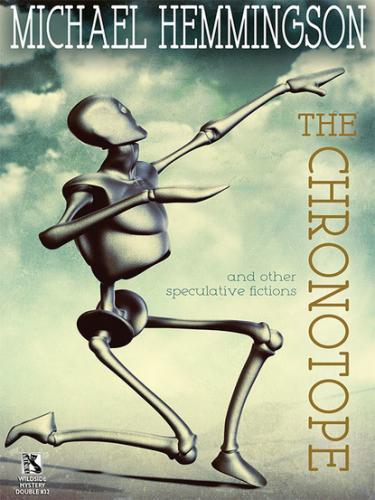“Thank you,” he said, and he was indeed grateful (mostly that the man had not shot him on sight, which Gabriel heard had happened on occasion).
“Daddy, do you know what this means?” one of the girls said. “We’re going to be famous! We bagged us a time traveler.”
“And rich,” the other girl said.
“Thank you for the clothes,” Gabriel said again.
“You need to meet my brother,” the man said, thinking and nodding his head. “Yes, my brother Harold—he’ll know what to do with you. He deals with these sorts of situations.”
IV.
Gabriel had appeared first; he didn’t know that his wife, Bethany, was six days behind him. When Bethany did show up in the middle of a street, she was taken to a police substation and her custody quickly switched over to government agent types in dark suits, who whisked her off to a Federal building downtown San Diego.
She was placed in a cold, bare room with silver walls and monitor cameras in all four corners. She had been given blue jeans and a green t-shirt to wear. No one said anything to her. They provided her food and water (or milk/soda, if she liked). They told her to wait.
Within an hour, a smartly dressed woman who was perhaps fifty years old walked in, holding a notepad and a file folder. She was shorter than Bethany.
Bethany had been pacing back and forth in the room; she was not concerned with her situation, she was worried about her husband and where he was.
“Please, sit down,” the woman said.
The two sat at the metal table in the room.
The woman looked at the uneaten food. “Not hungry?”
“No.”
“Have you been treated well?”
“Yes.”
“No abuse?”
“I don’t know what you mean.”
“Sometimes when female transmigrations appear naked in public, especially one as attractive and young as yourself…they are taken advantage of.”
“No. That did not happen. I have not been molested.”
The woman opened the file folder. “All right then. Almost got run over there, eh? Some travelers have appeared in the middle of the ocean or in the air, so yours is no great horror story. Can I have your name?”
“Bethany Morton.”
“What year are you from?”
“You call it 2533.”
“Your age?”
“Twenty-eight cycles.”
“Married?”
“Yes.”
“Did you travel with your husband?”
“Yes.”
“Where is he?”
“I do not know.”
“His name?”
“Gabriel Morton.”
“I’ll check the database and see if we have him yet…or not.”
“That is kind of you.”
“No kindness involved. Do you think we like having people from the future pop up out of nowhere? The world is crowded enough.”
“Not like mine.”
“How many people are there in 2533?”
“Thirty billion.”
The woman shook her head. “That’s incredible.”
“You have spoken to other transmigrators?” Bethany asked.
“A few.”
“Then you know why.”
“The chance to get away from an overpopulated world, I know, I’ve heard it all, I know the sales talk you folks were given by the people who run the time machines.”
“Not machine,” Bethany said. “Organics, metaphysics; desire is how.…”
The woman held up her hand. “Spare me the quantum pataphysics. I’ve never understood future technology. But there are colleagues of mine who want to know all about it and they will ask you a million questions.”
“I was told the authorities might detain me.”
“Indeed.”
“Am I a prisoner?”
“Not at all.”
“But I’m not free to go?”
“Not right now.”
V.
Harold Morris was a Hollywood agent, a big Hollywood agent, and he thought his brother, Dan, was bullshitting him when he said a time traveler showed up in his living room.
“Bullshit,” Harold said.
“I have him here, come over and see,” his brother said on the phone.
“If this is true.…”
“I figured you’d know what to do.”
“Oh,” Harold said, smiling, “I know exactly what to do.”
He left his office on Wiltshire and Santa Monica Boulevards and drove to his brother’s house, fifteen minutes away. The man who called himself Gabriel sat on the couch, a cup of coffee in his hand.
“This is amazing,” Gabriel said, drinking. “Wonderful.”
“You don’t have coffee in the future?” Harold asked.
“No.”
He introduced himself to Gabriel, sitting across from him. His brother’s wife and kids stood nearby, watching and listening. His brother sat next to him, shotgun in hand.
“You don’t need the weapon, Dan,” he said.
“I feel better with it near, right now.”
“You afraid he’ll run, along with your chance to cash in?”
“You could say that.”
“Mr. Morton,” Harold Morris said, “you’re about to have your fifteen minutes.”
“I am?” said Gabriel.
“I’m going to make you famous, my brother rich, and I’ll take 15% of everything—all merchandizing, any technological wonders you know about that could become of use, and your life story for a movie of the week. You will have status, wealth, and half the women in the world will want to take you to bed.”
The teenage girls giggled.
“Including my jailbait nieces,” Harold added.
“Then I will shoot him,” Dan said.
“I am married,” Gabriel said.
“Don’t listen to my brother,” Harold said. “He won’t kill his lottery ticket. Now, the government offers one million dollars for turning in a traveler who has not appeared in public. There’s that route. A better route is to exploit all possible revenue outlets—TV, print, radio, Internet. Exclusives, one-on-one interviews; an intimate look at the future. How does this sound so far?”
Gabriel sipped the coffee. “I don’t understand.”
“No worries. You will.”
VI.
The woman’s name was Grace, “Agent Beryl Grace,” she said. Bethany started to feel comfortable in her presence
